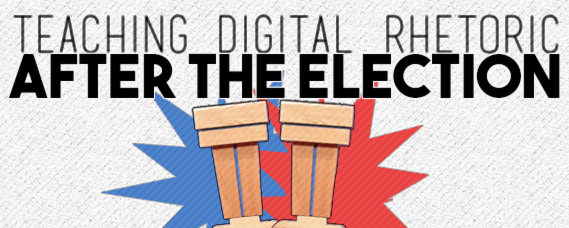
Call for Blog Carnival Contributions: Teaching Digital Rhetoric after the Election
Compositionists, communication scholars, and digital rhetoricians are already reflecting on and discussing post-election teaching strategies in their own departments. This conversation continues publicly on Twitter, in sponsored webinars, and in collaborative syllabus documents. We invite scholars to expand these ongoing conversations to make them practical and usable for instructors in our disciplines.
This blog carnival will explore how digital rhetoricians respond in their teaching and research to this post-election moment. We are seeking submissions in a wide variety of forms, including brief case studies, lesson plans, interviews, tool reviews, and book reviews. Submissions may be proposed in any medium appropriate for featuring digitally on the DRC, such as text, audio, and video.
Topics may include, but are not limited to:
- Digital rhetoric and the election
- Teaching digital technologies, interfaces, networks, and procedures post-election
- Algorithmic realities and bubbles
- Identity politics and inclusive teaching
- Controversy and/or “hot moments” in the classroom
- Surveillance and free speech
- Digital activism
- Media literacy
- Procedural and coding literacies
- Post-truth politics and the classroom
- Lesson plans or assignment ideas
- Reflections on election-related assignments, lesson plans, class discussions, etc.
At the end of the blog carnival, the DRC Graduate Fellows will compile pedagogical ideas and strategies from blog posts and discussions into a Post-Election Syllabus. In the vein of the #FergusonSyllabus and #StandingRockSyllabus, these resources will aim to be useful for composition and/or communication classes with a digital focus.
If you’re interested in contributing to this blog carnival, please send a short (100 words or less) proposal to drcfellows@umich.edu. We will be accepting and publishing posts throughout January and February, so please send your descriptions as soon as possible, but no later than January 20. Full blog posts will be due approximately two weeks after your 100-word proposal is accepted.
